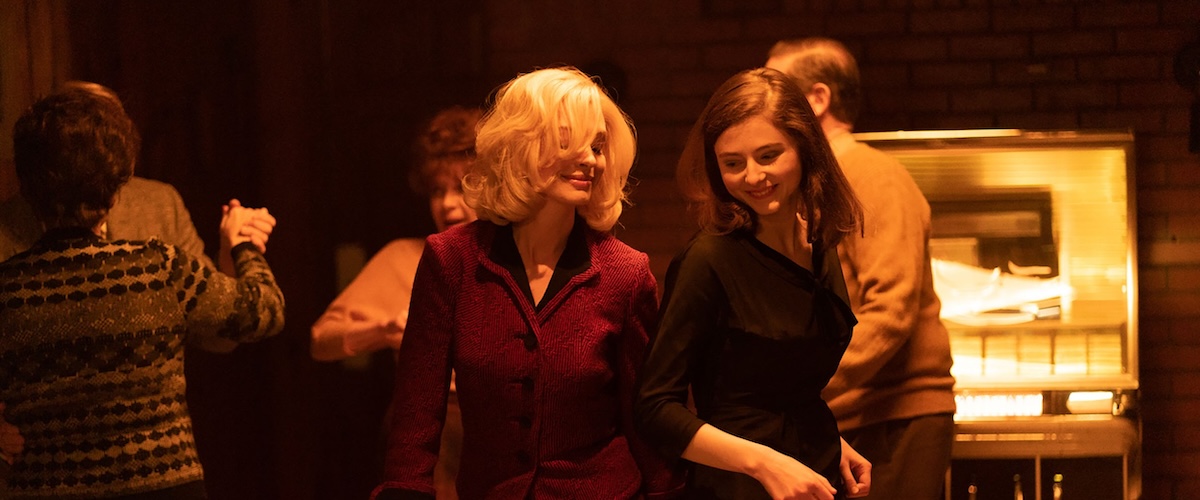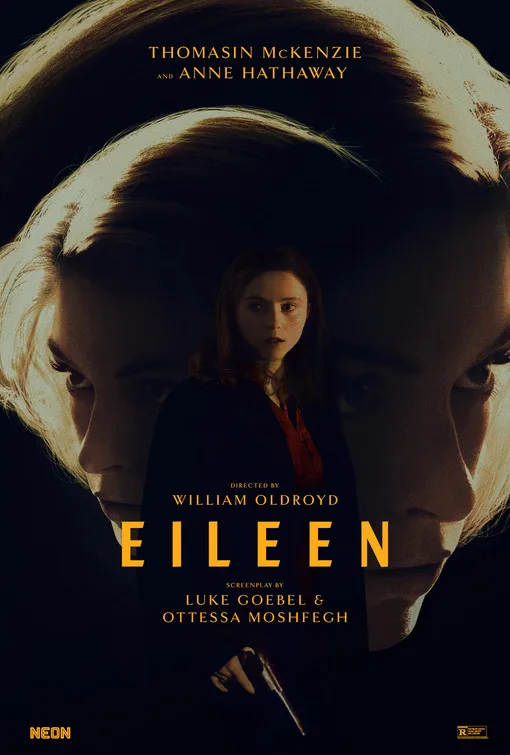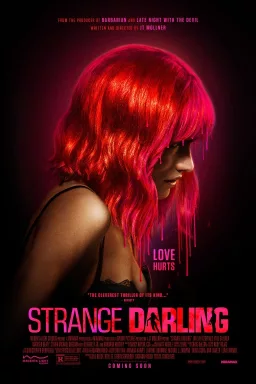Everything is ugly in Eileen’s life. Her small Massachusetts town is rickety and dingy. The house where she lives with her end-stages alcoholic father is the neighborhood eyesore. The “youth center for boys”, i.e., prison for kids, where she works, is aggressively ugly. The ugliness is so total Eileen (Thomasin McKenzie) doesn’t appear to notice it. Suddenly, like a vision from another world, Dr. Rebecca St. John (Anne Hathaway) gets out of her car and click-clacks across the icy pavement towards the juvenile center. Eileen gawks. The woman’s hair is a blonde bouncy “do.” Her suit is tailored, and her hat is chic. Or at least it’s chic to Eileen. In a world where beauty has no place, Rebecca dazzles.
We must remember that when we watch “Eileen,” directed with moody, twisty desolation by William Oldroyd, Eileen may not be the most reliable of narrators. A lifetime of being invisible and put-upon will do that to a person. Look closer at Rebecca. Her hair is more “nest” than “style.” She provocatively smokes a cigarette as though she’s ready for her closeup, not standing in a stale-aired office surrounded by troubled teenage boys. She seems a little bit tricky. There’s an edge there. But to Eileen, it’s as though Marilyn Monroe herself has entered her workplace and, wonder of wonders, become her new friend, her first friend.
Based on Ottessa Moshfegh’s astonishing first novel of the same name (screen adaptation by Luke Goebel), “Eileen” spends time establishing Eileen’s life rhythm, so we understand how destabilizing it is when that rhythm is shattered. Moshfegh’s book is told in the first person, with Eileen narrating the events of December 1964 from 50 years on, but the film smartly does not include voiceover. A voiceover narration would try to “explain” Eileen, filling in the blanks. “Eileen” leaves the blanks intact, and so there is a mystery here we can’t quite grasp.
When Eileen’s father (an excellent Shea Whigham) says to her, “Get a life, Eileen. Get a clue,” he has no idea his submissive daughter will follow his advice in just a couple of days. And “getting a life/clue” won’t look the way he thinks. Because Eileen has spent her life in the background, a shadowy silent figure, “getting a life” will be abrupt and messy, a little scary, powered by the alarming sense that it’s been a long time coming.
Describing “Eileen” this way makes it sound like “Carrie” or, on the flip side, an inspirational tale of “female empowerment.” “Eileen” has more in common with those 1970s cinematic evocations of loneliness and dissociation (even down to the old-school credits font), films like “Three Women,” “Two-Lane Blacktop,” “Five Easy Pieces,” or the final shot in the otherwise madcap “Shampoo.” “Alice Doesn't Live Here Anymore” is a possible precursor, although the mood of “Eileen” is wintry and disturbing, almost sociopathic. In the novel, Eileen notes the words on her pack of Pall Malls: “Per aspera ad astra,” meaning “through the thorns to the stars,” and observes, “That described my plight to a tee, I thought back then, though, of course, it didn’t.”
Eileen isn’t anti-social so much as she is a blank, like Travis Bickle is a blank, a blank waiting to be imprinted upon (by violence or tenderness, it doesn’t matter, whichever gets to him first). Eileen is un-realized. Her mother died some time ago. She lives with her father and sleeps on a cot in the attic, surrounded by candy wrappers. She is so blank almost anything could be projected upon her: she’d be prey to a charismatic user like Montgomery Clift’s fortune-hunter in “The Heiress.” She could conceivably join the Manson family if she made it to California in a couple of years. Both would make sense. Instead, there’s Rebecca, winking at her as though they share a dirty secret. Eileen swoons, expands, and fragments under Rebecca’s intense gaze.
Moshfegh’s novel is steeped in bodily filth: rotting teeth, body odor, snot, and armpit sweat. Although the film doesn’t go as far into this as the book, eloquent vestiges of it remain. There’s the first scene where Eileen sits in her car by the beach, watching a nearby couple making out. Eileen opens her car door, picks up a handful of slush, and shoves it down the front of her skirt. This is startling enough, but look closer: the slush around the car is spotted with yellow stains. And so it must be inferred that Eileen has been sitting there for hours, like a stalker, squatting beside the car to relieve herself. In the book, Eileen makes it a point to tell us she doesn’t wipe herself after going to the bathroom. There’s a moment in the film where riled up by a glimpse of the security guard she lusts over, Eileen reaches down into her skirt and touches herself, forgetting she’s in public. When she goes back to her duties, she surreptitiously sniffs her fingers.
Eileen’s feelings about her body and the grossness of having a body at all make up the novel’s texture. The screen adaptation is good, but it shies away from the intensity of the filth and Eileen’s belief that filth is not something to be cleaned up but wallow in. (One thinks, again, of Travis Bickle, who wants to clean up New York City, and yet wallows in ugliness and filth.) Thankfully, “Eileen” doesn’t betray its source material by turning Eileen into something more palatable and sympathetic, but the film loses something in the transfer.
New Zealand actress Thomasin McKenzie first came to international attention with her performance in Debra Granik’s 2018 film “Leave No Trace,” playing a 13-year-old girl living off the grid with her father. As Eileen, she shows a welcome unconcern for making Eileen “likable” or “relatable.” She evokes a believable feeling of emotional dislocation. Eileen isn’t your basic shy girl. She’s an untapped force, a sleeping dragon. Eileen doesn’t know what’s in her, and McKenzie makes that sense. Hathaway leans into Rebecca’s artificiality, posing, phony mid-Atlantic accent, and elaborate complicit winks. It’s hard to believe Rebecca is interested in hanging out with this cringing little woman wearing scratchy sweaters and trash-stained loafers. Their scenes together are electrifying. The always-good Marin Ireland nearly explodes the film’s fabric in her one scene, her trauma so authentic it rips the mask off of all Rebecca’s supposedly good intentions.
What happens between Rebecca and Eileen is best left to be discovered. “Eileen” is about a relationship of dangerously blurred boundaries. If Eileen is a blank, then Rebecca is even more so. Like attracts like. Eileen is young. Her attachment to her life is tenuous. One snip of the scissors, and she’d float away. But probably not “to the stars.” The thorns are Eileen’s true milieu.
Now playing in theaters.




















